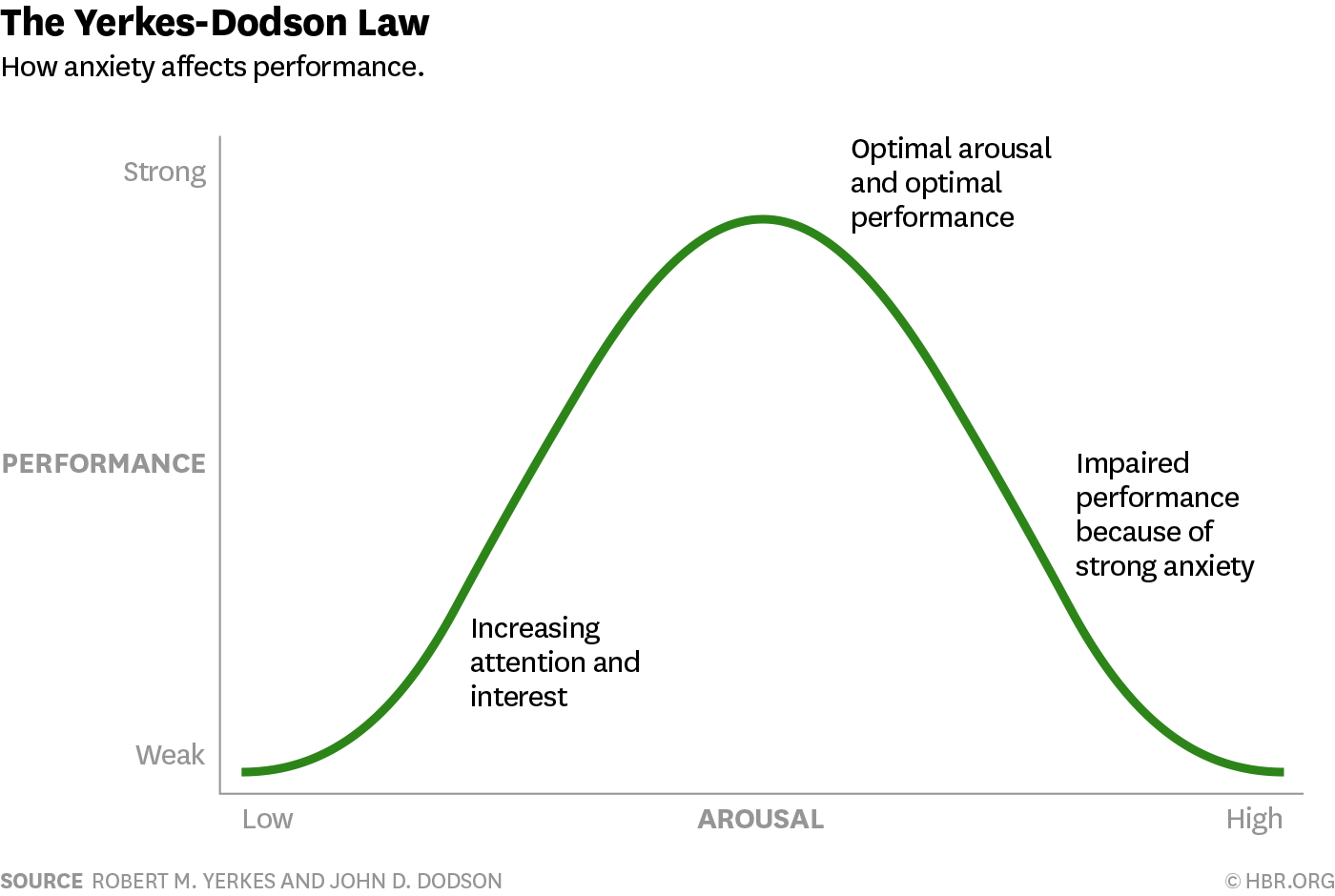The need for balance
In 1908 psychologists Robert Yerkes and John Dodson performed a set of experiments on mice. Using mild electric shocks, they taught the mice to learn tasks and adopt habits more quickly.
Their original hypothesis was that as cognitive arousal is increased, the ability to perform tasks and form habits would increase in turn. However, this was only true up to a certain point, later referred to as the optimal level.
Beyond that point, as the strength of the shocks was increased, the ability of the mice to learn tasks diminished due to the excess mental overhead of trying to avoid the shock while simultaneously attempting the task.
The second part might seem common sense on the surface. If I was getting electric shocks I’m sure I’d be terrible at performing tasks too. The interesting part, is that there is a small amount of cognitive stress we can undertake that actually improves our performance. This arousal is sufficient motivation to make us focus. The little buzz in the back of your head when confronted with a stimulating challenge that makes you sit up and pay attention. But when that state of arousal is too strong, anxiety rises and performance deteriorates.
Unfortunately in practice, you can’t magically pinpoint the optimum level of cognitive arousal that will maximise your output. The optimal level will differ from person to person, and also based on the task at hand. Complex tasks will require a lower level of arousal while simpler tasks might require much higher amounts. You just need a sufficient level of stimuli to induce focus.
Here’s a visual representation of the Yerkes-Dodson Law:

Traditionally this curve will always represent itself as an inverted U, but the exact shape will vary based on familiarity and complexity. Other factors affecting performance include existing competence at the task, your confidence either with the task itself or under a similar cognitive load, and your personality. Some people are more resilient to high-stress situations ab initio. Meanwhile, others may be less armored but can still adapt rapidly to emerging obstacles.
Managing stress
While acknowledging the use case for a manageable amount of stress, many of us are still coping with far too much of it. If you’re frequently finding yourself past the optimal point of arousal, here are some tools for moderating perceived stress.
Increase control
Increasing the extent to which you can fine-tune the stress you’re under is a good starting point. Of course, this is easier to do if you’re the boss and largely in charge of your time, but this can also be developed through active management of your cognitive bandwidth. I wrote a lot about this in a previous newsletter. In essence, by optimising your process management overhead, you’ll have more attention to focus on the tasks at hand, and avoid rapid burnout.
Strive for authenticity
Seth Godin’s explanation for why so many of us experience impostor syndrome is because we are in fact impostors. And that’s okay! To parse Charlie Munger, embrace your circle of competence and don’t waste additional effort pretending to be an expert outside your arena.
Draw a small circle around the things you are truly excellent at, and become king (or queen) of that domain. That doesn’t stop you from spreading your wings and learning beyond that horizon - quite the opposite. But the power is in distinguishing areas of expertise from areas of growth. Don’t be afraid to ask questions, and similarly don’t be afraid to assert yourself when your opinions have a strong foundation.
Build the muscle of not instantly conforming to opinions of colleagues and going with the status quo rather than advocating your position. Research suggests that authenticity at work — and by extension in public spheres — can have profound impact on your perceived stress and subsequent performance.
Use rituals
Per the Harvard Business Review, Michael Jordan wore his North Carolina shorts underneath his Chicago Bulls shorts at every game; Curtis Martin of the New York Jets reads Psalm 91 before every game; and Wade Boggs, as the third baseman for the Boston Red Sox, ate chicken before each game and took batting practice at exactly 5:17 p.m., fielded exactly 117 ground balls, and ran sprints at precisely 7:17 p.m. These rituals may sound strange, but they can actually improve performance.
Believe in your own luck
Several experiments have proven how easy it can be to create your own luck, and how subtle self-belief / positive reinforcement can have an outsized impact on performance.
In one experiment, people asked to hit a golf ball into a hole received either a so-called “lucky” golf ball or an ordinary golf ball. In another experiment, participants performing a motor dexterity task (placing 36 small balls in 36 holes by tilting the plastic cube containing them) were either asked to simply start the game or heard the researcher say they would cross their fingers for them. Even for those that didn’t believe in luck or petty superstition, the perception of luck enhanced people’s confidence in their abilities, motivated greater effort, and resulted in tangible improvement.
If you have any frameworks for managing stress or further thoughts on cognitive arousal, I’d love to hear from you! Reply via email, leave a comment or send me a tweet!

Reading list
Books I’ve read/seen/will impulsively buy and add to my “to read” shelf on Goodreads. Recommendations from newsletter readers are always welcome:
- Old Man’s War by John Scalzi - impulsively bought. It’s been a while since I read a straightforward space-based sci-fi, but Scalzi’s tone and pace make for an awesome intergalactic joyride..
- The Coddling of the American Mind by Jonathan Haidt and Greg Lukianoff - recommended. The book is based on the viral essay referenced by Obama and others across the political spectrum. The foundational ideas are strong, and I picked out some great insights on parenting, but when the lens turned towards racial issues I encountered many of the common flaws you’ll find when people with no lived experience postulate on what they imagine that lived experience should be.
- The Killing Room by Peter May - read. A complex thriller set in Shanghai.
Things I’m loving
Films and shows:
- Jujutsu Kaisen - I may be ruining my street cred by revealing my not-so-secret love for anime, but people have been raving about this for a while and I’ve finally caught on.
- Snowpiercer - Season two just started. If you’re not watching this already, you’re missing out. Fortunately, the episodes are released weekly so you have plenty of time to binge and catch up.
Resources:
- Hinge - Let the record reflect I signed up for this app under duress, at the behest of my friends. That said, my first inside glimpse of online dating has given me a lot of thoughts about my typical approach to evaluating potential partners.
- Headspace - I recently wrote about the importance of mindfulness and having time to step back and be still. Headspace is a great place to start for anyone looking to make meditation a habit.
- Audible - I’m on course to finish at least 13 books in the first 5 weeks of this year (number 11 will be a sure-fire recommendation next newsletter). Make the most of the daily/weekly deals and start your digital stockpile!







